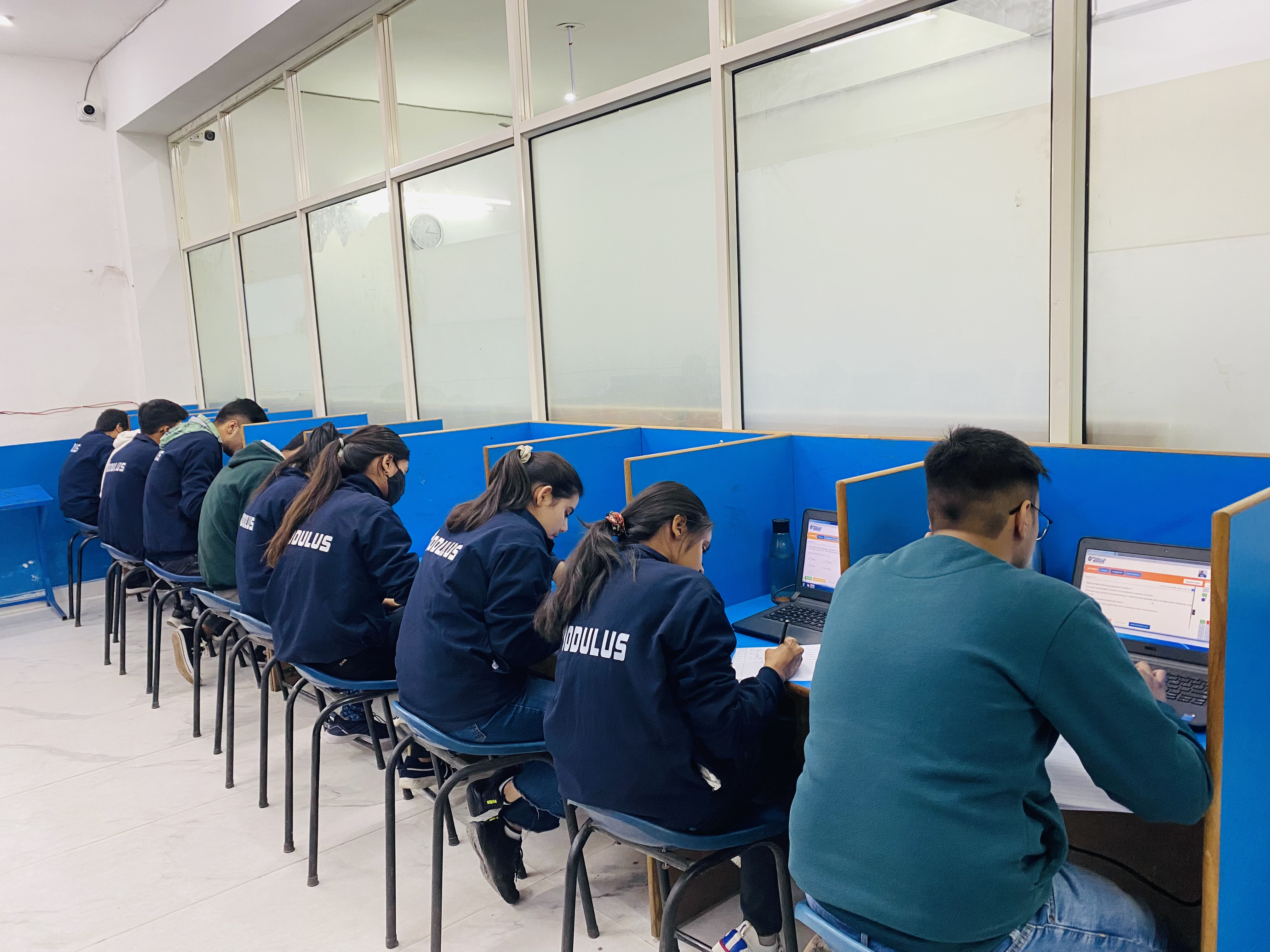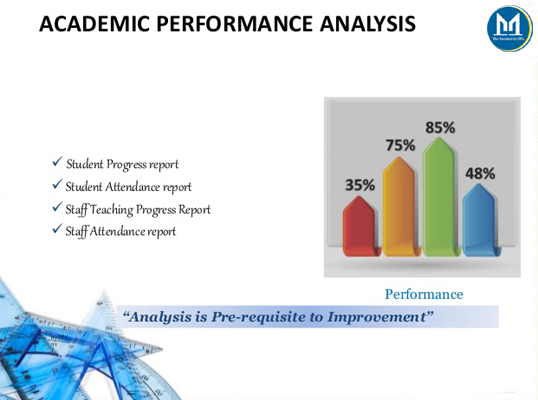Academic Team (Faculty)
- The Most Important Role in success of a student is played by the Faculty or the Teacher or the Coach. The Modulus faculty team have an outstanding combination of proven record, relevant experience, qualification, competence and most importantly care for students. We proudly can say that our faculty have a very rich experience of sending thousands of students to IITs, NITs, AIIMS and Govt. medical colleges.
- Our most of the Faculty members are graduates from premium institutes. They understand rigours and exact requirement of JEE/NEET Main from student point of view, and so they prepare them accordingly.
- We strongly believe that our faculty team is better equipped to train students for JEE/NEET than any other pool of faculty.
- Apart from Regular Teaching and Problems Solving; the Faculty members also deliver motivational thoughts and tips to revitalize the students and keep their momentum up towards the ultimate target.


Regular Classes
- Total Lectures per Week: 15 to 18.
- Each lecture consists of 90 Minutes duration.
- The 90 Minutes of each lecture is divided as follows: First 30 Minutes for DPP and Sheet/Module Discussion and last 60 Minutes are devoted for theoretical and conceptual learning.
- The 30 minutes discussion part is more of interaction type between student and teacher, and students are motivated to raise and discuss their doubts/objections to understand the concepts/fundamentals used in problem solving.
- Theoretical learning consist of Theory coupled with important concepts /fundamentals, formulae and is taught through solved/ unsolved examples/illustrations and derivations.
- The Faculty Members have their self-written notes to deliver the lectures and they include most appropriate examples during the class to understand the concepts fundamentally.
- Exhaustive & detailed Class Notes are prepared during the class by the students in the Classroom for all topics which almost eliminates the need of any other study material.
- Appropriate Home Work is assigned in the form of Daily Practice Problems (DPPs) and Problems from the Sheet/Modules.
- The assigned home work is discussed in the next class with interactive participation of the students.
Sheet
- The objective of the Sheet is to achieve perfection in a topic while it is being taught through rigorous practice of variety of problems of various levels.
- The entire syllabus of JEE Mains & JEE Advanced (XI & XII) is approximately divided into 25 to 30 Sheets in each subject.
- Every Sheet includes problems which are sequentially segregated in exercise of four different levels. Exercise 1 comprises of conceptual problems which require fundamental knowledge of the topic; thus it helps the student feel confident about the preparation of that particular topic immediately he/ she complete the topic.
- A Sheet consist of four practice exercises in total.
- First exercise includes objective type questions and divided in to two levels. In level 1 questions are divided sub topically according to lecture plan. Level 2 include mix type of questions.
- Second exercise of sheet includes subjective questions. In level 1 questions are divided sub topically according to lecture plan. Level 2 include mix type of questions.

- Third exercise of sheet includes more than one correct type questions, Match the column type questions, Paragraph type questions etc.
- Exercise four is further divided in two levels. Level 1 includes pervious JEE Main (AIEEE) questions while level 2 includes pervious years IIT - JEE questions.
- Sheets (P, C, M & B) which are designed for students who are studying in class IX or X cover complete school syllabus & Competitive exams (Olympiads, NTSE, KVPY) syllabus theory wise and have unsolved exercise divided as for school exam purpose and competitive exam purpose. Class X sheet also includes last 10 year board exams questions from ICSE/CBSE Board as well as from RBSE Board.
- The Answers for all the problems are provided at the end of the Sheet for reference to the students.
- After each Theory Class; the student is assigned to attempt some problems from the Sheet (keeping in mind around 15 Questions per Lecture per Subject) as Home Work. Further, these problems are discussed in the successive Theory Class for better understanding of the concepts/fundamentals of the portion of topic taught in the previous class.
- The selection of Problems is very specific in nature, covering each and every aspect of the theory and fundamentals/concepts of the topic.

Daily Practice Problems
- DPPs are popularly known as Daily Practice Problems. It is a set of Problems assigned to the student as a part of the Home Work and is to be attempted at home.
- Typically a DPP contains 10-15 Problems (on an average 12 problems). It includes all variety of problems like Single Choice, Multiple Choice, Short Subjective, Long Subjective, Match the Column, Comprehension, Assertion & Reason, True & False, Fill in the Blanks and Miscellaneous Type. Further, DPPs can be changed according to the latest JEE Mains/ JEE Advanced.
- A DPP consists of questions mostly based upon the syllabus studied/learned in the previous lectures. Few problems in each DPP are also included from the topics previously taught for the continuous revision of old topics.
- The Discussion of problems of DPP is done in the next lecture. It boosts the morale of the student by doing sufficient practice of the theory taught in the classroom by practicing/solving the problems himself based upon that in the succeeding lectures.
- DPP gradually helps in developing a habit and practice of revision of the syllabus. The problems of DPPs can be marked/highlighted at the time of attempting so that they can work as an additional Question Bank and help in better revision before the JEE Mains, JEE Advanced Exams.
- The DPP is an important tool of Modulus’s Teaching Methodology. Its importance can be understood by the fact that if a student attempts the DPP regularly with full sincerity and commitment; he/she may have more than 75% chances of getting selected in JEE Mains/JEE Advanced with a good All India Rank (AIR).
Regular Doubt Discussion Classes
- The main Objective of Doubt Discussion Classes is to provide additional attention and care to the students who couldn't understand a concept at first which is now affecting their performance.
- It also helps those students who hesitate to ask/discuss their doubts in the classroom because of their shyness and their past academic environment.
- Doubt Discussion Class is a One to One Discussion Forum between the student and the teacher.
- It is a regular facility available at Modulus throughout the academic session for all the classes. We display Doubt class timings of subject experts on notice board for morning as well as for evening sessions. Students can come according to their preference. Student can also come just before the class or any other day to clear his own doubts.
- Doubt Discussion Class encourages the students to clarify their doubts immediately without affecting the performance by ensuring firm hold on the concepts/fundamentals of the subject.
.jpg)
- A student feels Personal Touch/Attention while attending the Doubt Discussion Classes. It motivates him to focus on his/her target with improved energy and enthusiasm.
- Sometimes Doubt Discussion Classes become a good platform to recover the lost syllabus for those students who couldn't take admission at the time of beginning of the course and have got delayed due to some reason(s).
- The Doubt Discussion Classes are also very helpful to those students who don't feel confident in a particular subject and it is affecting their overall performance. Through Doubt Discussion Classes such students can increase their grasp in that subject.

Regular JEE (Main & Advanced) Tests
- The objective of Regular Testing is continuous assessment of the level of preparedness of student (own/comparative) and compelling him to study, practice and perform according to the requirements of JEE Mains, JEE Advanced Exams.
- The Periodic Assessment Tests are conducted twice in a month.
- The pattern of Periodic Assessment Tests for class XI & XII is as per JEE Mains & JEE. One test will be JEE Main Style then next one will be JEE Advanced Style.
- Once in a month we also conduct Board Style test. Since board style test develops an attitude to solve the problems in step-by-step manner; it is very helpful for regular school going students in terms of daily learning and to practice for writing CBSE/RBSE or ISC Board.
- The Pattern of periodic Assessment Tests for Class IX & X is as per CBSE/RBSE or ICSE Board along with competitive exams like Olympiads, NTSE etc.
- The result of a Periodic Assessment Test is displayed to all the students with marks/percentage in Physics, Chemistry and Mathematics separately and with Current % & Current Rank and Cumulative % & Cumulative Rank.
- The quantity of Periodic Assessment Tests is sufficient to remove the examination fear amongst the students.
- The Performance in Periodic Assessment Tests reflects student's chances of becoming successful in JEE Mains/ JEE Advanced or Board Exams.
Computer Lab
- Modulus, we have a well-equipped Computer lab and a Library. Our Computer lab has more than 2 lac questions based on JEE Main & JEE Advanced and those are divided in to subtopic wise, topic wise, Mixed concept wise, Paragraph type, Match the column type, Integer type etc.
- A student can practice any chapter any number of times at computer library to excel in that particular chapter or in particular subject.


Academic Performance Analysis
- At Modulus, Students' academic performance in each test is analyzed on various parameters at Macro Level through Students' Test Analysis Report (STAR). These parameters include individual student's performance, average performance of all the students in the course, cumulative performance, comparison with best performers etc.
- The academic performance of a student is also analyzed and studied at Micro level (i.e. subject wise, topic wise, question wise etc.) and special academic initiatives are taken to improve the performance.
- The overall focus of the Academic Performance Analysis is on the improvement in the subject knowledge, understanding of the fundamentals behind scientific concepts, application of the concepts in problem solving with speed & accuracy through rigorous practice and persistence.